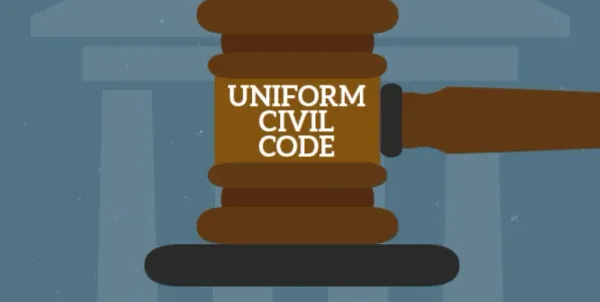Table of contents
The Uniform Civil Code (UCC) proposes replacing the personal laws based on the scriptures and customs of each major religious community in India with a common set of rules governing every citizen.
The UCC aims to provide a unified legal framework for issues such as marriage, divorce, inheritance, and adoption, irrespective of religion.
Objective
- To ensure equality and justice for all citizens by providing a common set of laws.
- To eliminate discrimination based on religion in matters of personal law.
- To promote national integration by removing disparate laws.
Current Scenario
- India currently follows different personal laws for different religious communities.
- Hindus: Governed by the Hindu Marriage Act, 1955; Hindu Succession Act, 1956; etc.
- Muslims: Governed by the Muslim Personal Law (Shariat) Application Act, 1937.
- Christians: Governed by the Indian Christian Marriage Act, 1872; Indian Divorce Act, 1869.
- Parsis: Governed by the Parsi Marriage and Divorce Act, 1936.
- These laws cover aspects like marriage, divorce, inheritance, and adoption.
What are the rules?
While the specific details of the proposed UCC are not finalized and can vary, the general principles and rules often discussed include:
Marriage and Divorce
- Age of Marriage: Uniform age of marriage for men and women (usually 18 years for women and 21 years for men).
- Monogamy: Legalizing only monogamous marriages, making polygamy and polyandry illegal for all communities.
- Registration of Marriage: Mandatory registration of marriages to ensure legal validity and documentation.
- Grounds for Divorce: Common grounds for divorce such as cruelty, desertion, adultery, irretrievable breakdown of marriage, mutual consent, etc.
- Maintenance and Alimony: Equal rights to maintenance and alimony for spouses, ensuring financial support after divorce.
Inheritance and Succession
- Equal Inheritance Rights:
- Equal rights for sons and daughters in the inheritance of parental property.
- Equal rights for widows and widowers in the inheritance of their deceased spouse's property.
- Abolition of Gender Discrimination practices like the preference for male heirs in certain religious laws.
- Testamentary Succession: Providing guidelines for testamentary succession (wills), ensuring fairness and clarity.
Adoption and Guardianship
- Uniform Adoption Laws: Common rules for adoption, including eligibility criteria for adoptive parents and the rights of adopted children.
- Guardianship: Equal rights and responsibilities for both parents in matters of guardianship and custody of children.
Maintenance and Support
- Spousal Maintenance: Common rules for the provision of maintenance to spouses, ensuring financial support in case of separation or divorce.
- Child Support: Uniform rules for child support, ensuring that children receive adequate financial support from both parents.
Other Provisions
- Abolition of Discriminatory Practices: Eliminating practices that are discriminatory towards any gender or community, ensuring equality and justice for all.
- Uniform Procedures: Standardizing legal procedures related to personal laws to simplify and streamline the legal process.
- Protection of Rights: Ensuring the protection of fundamental rights guaranteed by the Constitution, such as equality, non-discrimination, and freedom of religion.

Implementation and Enforcement
- Legal Framework: Establishing a legal framework for implementing and enforcing the UCC, including creating specialized courts if necessary.
- Public Awareness and Education: Initiatives to educate the public about the UCC and its benefits, ensuring smooth acceptance and transition.
- Consultation and Consensus: Engaging in consultations with various stakeholders, including religious communities, legal experts, and civil society, to build consensus and address concerns.
Constitutional Provisions
- Article 44 of the Indian Constitution: "The State shall endeavour to secure for the citizens a uniform civil code throughout the territory of India."
- This article is part of the Directive Principles of State Policy, which are non-justiciable but aim to guide the country's governance.
Recent Developments
- Uttarakhand: On February 7, 2024, the Uttarakhand State Legislative Assembly passed the Uniform Civil Code, Uttarakhand, 2024 Bill, making it the first state in India to pass a law on UCC. The bill was granted assent by President Droupadi Murmu on March 13, 2024.
- Key Provisions:
- Common laws on marriage, divorce, inheritance, and live-in relationships for all residents except the tribal community.
- It aims to create uniformity in personal laws irrespective of religious background.
- Key Provisions:
- Political Context:
- The bill's passage fulfilled a pre-poll promise made by Chief Minister Pushkar Singh Dhami during the 2022 assembly elections.
- The Chief Minister termed it a "historic moment" for the state.
Arguments For UCC
- Equality: Ensures equal treatment of all citizens under a single set of laws.
- Secularism: Strengthens the secular fabric of the nation by removing religious biases in personal laws.
- Simplification: Simplifies the legal system by reducing the complexity of multiple personal laws.
- Gender Justice: Promotes gender equality by eliminating discriminatory practices in personal laws.
Arguments Against UCC
- Cultural Sensitivity: Different communities have unique customs and traditions that may be undermined by a uniform code.
- Religious Freedom: This may be perceived as an infringement on the right to practice one's religion.
- Practical Challenges: Implementing a uniform code across a diverse country like India poses significant challenges.
Conclusion
The Uniform Civil Code remains a contentious issue in India, balancing the ideals of equality and secularism with the practicalities of cultural diversity and religious freedom. The recent developments in Uttarakhand mark a significant step towards the implementation of UCC, but its nationwide adoption will require careful consideration of various socio-political factors.
Previous Post